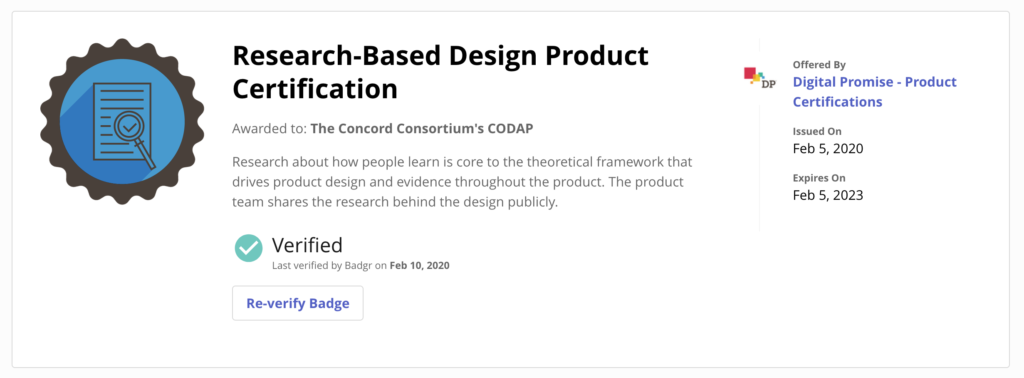We are delighted to announce that our Common Online Data Analysis Platform (CODAP) has earned the Research-Based Design product certification from Digital Promise. The new product certification is intended to serve as a rigorous, reliable signal for consumers, including school administrators, educators, and families looking for evidence of research-based educational technology products.
CODAP is easy-to-use web-based software that makes it possible for students in grades 6 through college to visualize, analyze, and ultimately learn from data. Whether the source of data is a game, a map, an experiment, or a simulation, CODAP provides an immersive, exploratory experience with dynamically linked data representations, including graphs, maps, and tables.
Senior scientist and lead CODAP developer William Finzer says, “The CODAP learning environment is designed to draw students into the process of working with data. We want students to find data exciting. We want them to feel confident that they can use data to understand the world and make discoveries that will help make the world a better place.”
Digital Promise is a nonprofit organization that builds powerful networks and takes on grand challenges by working at the intersection of researchers, entrepreneurs, and educators. Their Research-Based Design product certification confirms the link between research on how students learn and the design of CODAP. We’re proud to be among the first 13 companies to receive this certification.
“Schools and families want to know which edtech products can actually help students learn,” said Karen Cator, president and CEO of Digital Promise. “Digital Promise’s Product Certifications are designed to help strengthen consumers’ confidence in choosing research-based products, while recognizing product developers doing the important work of incorporating valid research into their designs.”
After nearly a decade of edtech marketplace research, Digital Promise recognized that while consumers want to know whether a product will improve learning, there is a strong distrust of product-authored studies. Additionally, edtech efficacy or pilot studies conducted once products were already chosen were found to be largely impacted by contextual factors like educator buy-in or a school’s technology infrastructure. Through Product Certifications, consumers can narrow their options as they select products by identifying edtech that is truly based in research about learning before trying it out in their classrooms.
The Research-Based Design product certification uses a competency-based learning framework, developed in consultation with Digital Promise’s Learner Variability Project advisory board, expert researchers in learning sciences, and dozens of educators across the United States. Learn more in Digital Promise’s new report, Designing Edtech that Matters for Learning: Research-Based Design Product Certifications (pdf).
